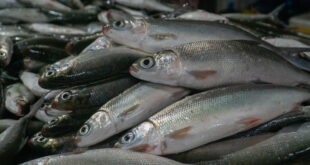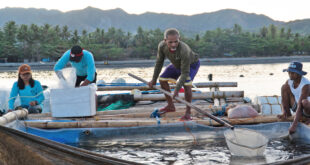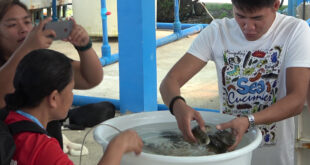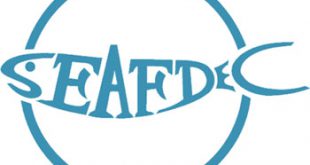Feed formulation and preparation
With the rapid development in in aquaculture and decreasing volume of catch from capture fisheries, focus is now on improving fish/shrimp culture systems. Nutrition is one of the major factors in increasing aquaculture productions, since natural food organisms such as phytoplankton and zooplankton may not be sufficient for the culture system. There is a need to supplement formulated diets in order to meet the requirements of the cultured species.
To address the needs of aquaculture technicians and fish nutritionists for basic theoretical information and technical skills in aquaculture nutrition, SEAFDEC/AQD offered the fish nutrition course staring in 1989.
Rationale
SEAFDEC/AQD, as one of its mandates, developed this training course to transfer and to disseminate technologies for broodstock management, seed production and nursery of sandfish to various stakeholders: hatchery owners, technicians, extension workers, aquaculturists, and private entrepreneurs.
Objectives
At the end of the course, the participants are expected to be able to;
- apply basic nutrition and feeding theories in determining requirements of cultivable species;
- formulate and prepare artificial feed based on feeding habit/behavior and digestive physiology of cultured species;
- evaluate feeds with respect to conversion rates, digestibility, and nutritional efficiency;
- apply proper techniques in feed preparation and storage; and
- apply correct feeding procedure and practices.
Methodology
The six-week course consists of lecture sessions, practical activities, field trip, and other activities like library work, orientation, presentation of larval rearing work, etc. Powerpoint presentations are used during the lectures. Video showing (if needed) and other related videos are shown to complement the lectures and to facilitate easy learning. Lecture topics include shrimp/fish nutrient requirements; feed formulation, preparation and storage; feeding habits and behavior; apparent digestibility measurement; lipids and fatty acids; carbohydrates and energy; vitamins and minerals; and economics of feeding. Special lecture topics related to the course are also included.
Practical activities are hands-on type of activities and are closely supervised by practical instructors and practical assistants. These activities are conducted at SEAFDEC/AQD’s training laboratory, fish nutrition laboratory, and feedmill. Practical activities include feeding experiment; feed preparation of formulated diets; physical, chemical and biological evaluation of formulated diets; feed mill operation; proximate analysis and other related activities.
Lecture notes and practical hand-outs are given to the trainees before the start of the lectures.
Seaweed farming
The red seaweed, Kappaphycus is commonly called “guso” or “tambalang”. It is one of the top three marine-based export as it contributes 80% of the Philippines’ seaweed export. The Philippines is one of the four seaweed producing countries in the world. This seaweed can be found growing abundantly in the shallow waters of Jolo, Tawi-Tawi, Cebu and Bohol.
Rationale
SEAFDEC/AQD, as one of its mandates, developed this training course to transfer and to disseminate technologies for seaweed farming and management, selection of site to various stakeholders: hatchery owners, technicians, extension workers and aquaculturists.
Objectives
General – The course aims to provide participants with technical knowledge and skills on the farming of seaweed, Kappaphycus spp.
Specific – At the end of this training course, the participants are expected to be able to produce seaweeds, Kappaphycus spp. by knowing how to:
- identify the species of seaweeds and site appropriate for culture; and
- apply proper culture techniques and management of the culture area.
Methodology
The 15-day course consists of lecture sessions, practical activities, field trip, and other activities like library work, orientation, presentation of results, etc. Powerpoint presentations are used during the lectures. Video showing (if needed) and other related videos are shown to complement the lectures and to facilitate easy learning. Lecture topics include concepts and principles of sustainable aquaculture; status of the seaweed industry; biology and taxonomy of seaweeds; and nursery culture and grow-out culture. Special lecture topics related to the course are also included.
Practical activities are hands-on type of activities and are closely supervised by practical instructors and practical assistants. These activities are conducted at SEAFDEC/AQD’s training laboratory, seaweed laboratory, analytical laboratory and Igang Marine Station in Guimaras. Practical activities include life stages of seaweeds; identification of Kappaphycus; preparation of culture materials and media; production of micropagules; land-based nursery culture; cage construction; planting of seaweeds; preservation and identification of seaweeds; and economics of seaweed farming.
Lecture notes and practical hand-outs/guides are given to the trainees before the start of the lectures.
For more information, please email training@seafdec.org.ph
 SEAFDEC/AQD Southeast Asian Fisheries Development Center | Aquaculture Department
SEAFDEC/AQD Southeast Asian Fisheries Development Center | Aquaculture Department



